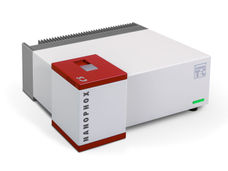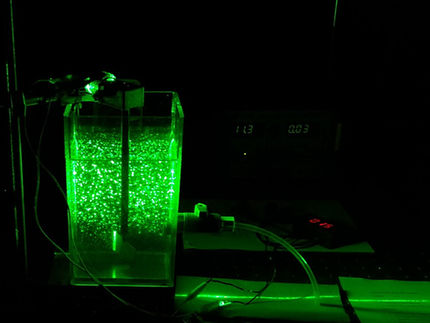Cleaning water with ‘smart rust’ and magnets
New method for pollutants such as crude oil, glyphosate, microplastics and hormones
Pouring flecks of rust into water usually makes it dirtier. But researchers of FAU have developed special iron oxide nanoparticles they call “smart rust” that actually makes it cleaner. Smart rust can attract many substances, including oil, nano- and microplastics, as well as the herbicide glyphosate, depending on the particles’ coating. And because the nanoparticles are magnetic, they can easily be removed from water with a magnet along with the pollutants. Now, the team is reporting that they’ve tweaked the particles to trap estrogen hormones that are potentially harmful to aquatic life.
The researchers presented their results at the fall meeting of the American Chemical Society (ACS) which features about 12,000 presentations on a wide range of science topics.
“Our ‘smart rust’ is cheap, nontoxic and recyclable,” says Prof. Dr. Marcus Halik, Chair of Polymer Materials. “And we have demonstrated its use for all kinds of contaminants, showing the potential for this technique to improve water treatment dramatically.”
Nanoparticles capture pollutants
For many years, Halik’s research team has been investigating environmentally friendly ways to remove pollutants from water. The base materials they use are iron oxide nanoparticles in a superparamagnetic form, which means they are drawn to magnets, but not to each other, so the particles don’t clump.
To make them “smart,” the team developed a technique to attach phosphonic acid molecules onto the nanometer-sized spheres. “After we add a layer of the molecules to the iron oxide cores, they look like hairs sticking out of these particles’ surfaces,” says Halik. Then, by changing what is bound to the other side of the phosphonic acids, the researchers can tune the properties of the nanoparticles’ surfaces to strongly adsorb different types of pollutants.
Early versions of smart rust trapped crude oil from water collected from the Mediterranean Sea and glyphosate from pond water collected near the researchers’ university. Additionally, the team demonstrated that smart rust could remove nano- and microplastics added to lab and river water samples.
After crude oil, glyphosate and microplastics, now hormones
So far, the team has targeted pollutants present in mostly large amounts. Lukas Müller, a graduate student who’s presenting new work at the meeting, wanted to know if he could modify the rust nanoparticles to attract trace contaminants, such as hormones. When some of our body’s hormones are excreted, they are flushed into wastewater and eventually enter waterways. Natural and synthetic estrogens are one such group of hormones, and the main sources of these contaminants include waste from humans and livestock. The amounts of estrogens are very low in the environment, says Müller, so they are difficult to remove. Yet even these levels have been shown to affect the metabolism and reproduction of some plants and animals, although the effects of low levels of these compounds on humans over long periods aren’t fully known.
Estrogens attach to rust particles
“I started with the most common estrogen, estradiol, and then four other derivatives that share similar molecular structures,” says Müller. Estrogen molecules have a bulky steroid body and parts with slight negative charges. To exploit both characteristics, he coated iron oxide nanoparticles with two sets of compounds: one that’s long and another that’s positively charged. The two molecules organized themselves on the nanoparticles’ surface, and the researchers hypothesize that together, they build many billions of “pockets” that draw in the estradiol and trap it in place.
Because these pockets are invisible to the naked eye, Müller has been using high-tech instruments to verify that these estrogen-trapping pockets exist. Preliminary results show efficient extraction of the hormones from lab samples, but the researchers need to look at additional experiments from solid-state nuclear magnetic resonance spectroscopy and small-angle neutron scattering to verify the pocket hypothesis. “We are trying to use different puzzle pieces to understand how the molecules actually assemble on the nanoparticles’ surface,” explains Müller.
In the future, the team will test these particles on real-world water samples and determine the number of times that they can be reused. Because each nanoparticle has a high surface area with lots of pockets, the researchers say that they should be able to remove estrogens from multiple water samples, thereby reducing the cost per cleaning. “By repeatedly recycling these particles, the material impact from this water treatment method could become very small,” concludes Halik.
Topics
Organizations
Other news from the department science
These products might interest you

NANOPHOX CS by Sympatec
Particle size analysis in the nano range: Analyzing high concentrations with ease
Reliable results without time-consuming sample preparation

Eclipse by Wyatt Technology
FFF-MALS system for separation and characterization of macromolecules and nanoparticles
The latest and most innovative FFF system designed for highest usability, robustness and data quality

DynaPro Plate Reader III by Wyatt Technology
Screening of biopharmaceuticals and proteins with high-throughput dynamic light scattering (DLS)
Efficiently characterize your sample quality and stability from lead discovery to quality control

Get the chemical industry in your inbox
By submitting this form you agree that LUMITOS AG will send you the newsletter(s) selected above by email. Your data will not be passed on to third parties. Your data will be stored and processed in accordance with our data protection regulations. LUMITOS may contact you by email for the purpose of advertising or market and opinion surveys. You can revoke your consent at any time without giving reasons to LUMITOS AG, Ernst-Augustin-Str. 2, 12489 Berlin, Germany or by e-mail at revoke@lumitos.com with effect for the future. In addition, each email contains a link to unsubscribe from the corresponding newsletter.






























































